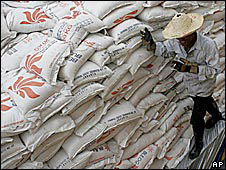
|
 |
 |
 News Around the Republic of Mexico | May 2008 News Around the Republic of Mexico | May 2008  
Mexico's Poor Get Food Cash Boost
 BBC News BBC News
go to original


| | The price of staple foods such as rice has risen sharply in the last year. | | |
The Mexican government is to give its poorest citizens a monthly cash payment of 120 pesos ($11.55; £5.85) to help them cope with rising food prices.

The news came a day after the country said it would cut tariffs on imported crops such as corn, wheat and rice.

In a further sign of the impact of rising food and fuel costs, inflation in Vietnam jumped to 25% in May, the highest rate for 10 years.

Average food costs have risen by 42.4% in a year, the Statistics Office said.

Growing demand

In Mexico, official figures show consumer prices rose by 4.55% - the fastest rate for three years - in the 12 months to 30 April, led by increases in the cost of tomatoes, chicken and cooking oil.

Growing demand from fast-expanding countries such as India and China has been blamed for spiralling food prices, along with record fuel costs and the use of grain to produce bio-fuels.

Governments around the world are under pressure to intervene to help the poorest cope with the sharp food price rises.

There have been public demonstrations about food prices in a number of countries including Egypt and South Africa.

Mexico's monthly cash payment, which will go to 26 million people in the Latin American country, equates to just over twice the national daily minimum wage of 50 pesos.

The government faced street protests last year when the price of tortillas doubled.

Rice restrictions

Vietnam has seen the price of rice, its staple food, jump 67.8% in the last 12 months, according to government figures.

One of Vietnam's most important sources of imported rice, Cambodia, stopped exporting the grain in March.

It is one of a number of rice-producing countries, including India, Egypt and Indonesia, to have either banned or restricted exports in recent months to secure supply for domestic customers.

On Tuesday, Cambodia was set to resume exports of rice after its two-month ban ended.

Prime Minister Hun Sen said only rice that was not needed for domestic consumption could be sold for overseas consumption until the new harvesting season began in December.

Last year, that amounted to 1.6 million tons of milled rice. | 
 | |
 |



